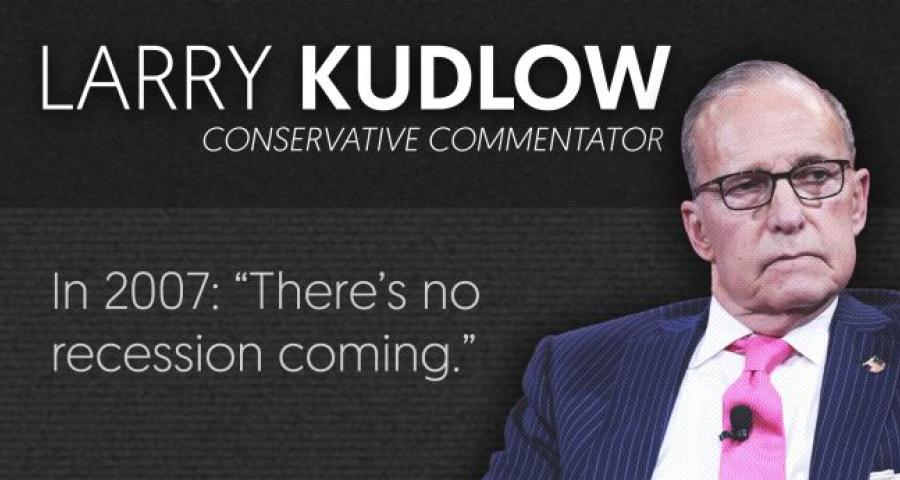President Donald Trump has told people he has chosen CNBC's Larry Kudlow to replace Gary Cohn as the director of the National Economic Council. Kudlow has no formal training in economics, and he has a history of making poor financial predictions, pushing conservative economic talking points, and making outrageous and offensive comments.

Research/Study
Trump’s pick for National Economic Council is a CNBC host who gives bad financial advice
Written by Bobby Lewis & Madeline Peltz
Published
-
Update: On March 14, Politico reported that Larry Kudlow accepted the position of director of the National Economic Council.
With Gary Cohn out, CNBC’s Larry Kudlow is “leading contender” to head National Economic Council
CNN: President Donald Trump is telling people that “that he has settled on Larry Kudlow to replace Gary Cohn.” According to a CNN report, on Monday President Trump began telling people that “he has settled” on senior CNBC contributor Larry Kudlow “to replace Gary Cohn as the new director of the White House's National Economic Council,” even though no announcement has been made and Kudlow has not decided whether he would accept the offer. Cohn recently resigned over Trump’s decision to impose tariffs on aluminum and steel. From CNN:
President Donald Trump told people Monday that he has settled on Larry Kudlow to replace Gary Cohn as the new director of the White House's National Economic Council, according to a source familiar with his conversations.
The President is known to change his mind at the last minute, and decisions are rarely final until they have been formally announced, but this is his latest thinking on Cohn's replacement.
Trump has spoken to Kudlow multiple times over the past week, a separate person familiar with the matter said, but Kudlow hasn't been formally offered the job yet and hasn't decided whether he would accept it.
The White House did not respond to a request for comment. Kudlow also declined to comment.
Kudlow isn’t even an economist, but he plays one on TV
Kudlow does not have either a graduate or undergraduate degree in economics and has not written scholarly papers on the subject.
Kudlow argued in 2002 that invading Iraq would create an economic boom in the United States.
In December 2007, while the Great Recession was beginning, Kudlow insisted “there ain’t no recession” and the “Bush boom continues.” Kudlow wrote, “There’s no recession coming. The pessimistas were wrong. It’s not going to happen. At a bare minimum, we are looking at Goldilocks 2.0.”
In July 2008, seven months into the recession, Kudlow was still arguing that there was no recession or housing crisis, arguing that America was “in a mental recession, not an actual recession.”
In September 2008, Kudlow argued that lower oil prices would “make it much easier for people to pay their mortgages on time,” thus abating the growing credit crisis.
Kudlow’s “heroes of the recovery” were President George W. Bush, Bush's treasury secretary, the Bush-appointed Fed chairman, and “the business investment capitalist.”
Kudlow “argued that banks that manipulated benchmark interest rates were actually the victims, rather than criminals,” according to The Nation. “This is Alice in Wonderland logic,” wrote Eliot Spitzer.
Kudlow said that he was “grateful” that the “human toll” from the Fukushima nuclear disaster was worse than the “economic toll.” He later apologized.
Kudlow credited the tea party with economic gain during the Obama administration.
In a rant about President Barack Obama’s first 100 days, Kudlow accused the former president of declaring “war against investors, businesses, and entrepreneurs,” and “replacing the rule of law” with “political decisions.”
In 2009, Kudlow warned about a “federal Taliban [being] unleashed against small businesses.”
While discussing a policy of the Federal Reserve in 2009, Kudlow lit a dollar bill on fire.
Kudlow and Fox Business regular Charles Gasparino discussed whether Obama’s treasury secretary used “the Soviet style” or “the Don Corleone style” of persuasion.
Kudlow called the “higher income inequality” of the modern era a “falsehood” and denounced Obama’s “tired, banal, and boring” policy focus on the issue.
Kudlow argued that the country began stress tests on banks in 2009 because the Obama administration needed a villain.
Kudlow suggested Trump’s “protectionist” trade policies could cause an economic depression but endorsed Trump anyway.
Kudlow claimed that “the best way to raise wages is to slash the business tax rates.”
Kudlow has frequently argued that marriage is a silver-bullet solution to poverty.
Kudlow lectured single parents about poverty despite admitting he had “virtually no knowledge in this field.”
Kudlow is a climate denier prone to misinformation and absurd commentary
As a CNBC host, Kudlow repeatedly cast doubt on climate science. He has called climate science “kind of a scam analysis” and, in 2013, hosted a representative of the fossil fuel industry-funded American Enterprise Institute to “counter” Obama’s “climate change confusion.”
Kudlow dismissed the Keystone Pipeline’s environmental impacts by claiming animals would “like to snuggle under the pipeline” for “warmth.”
Kudlow falsely claimed that under the Affordable Care Act’s individual mandate, uninsured Americans faced “a $25,000 fine, or imprisonment, or both.”
Kudlow claimed Hillary Clinton’s “shriek” about human rights “was like something out of Lenin or Trotsky.”
Kudlow complained about President Obama’s “Boyz n The Hood handshake” with then-Venezuelan President Hugo Chavez.
Kudlow argued that it was inappropriate for Obama to hug Rahm Emanuel, as it showed “weakness” and “lacked dignity.”
Teasing a “swine flu update,” Kudlow asked, “Does that mean I'm going to have to call this the Mexican flu?”